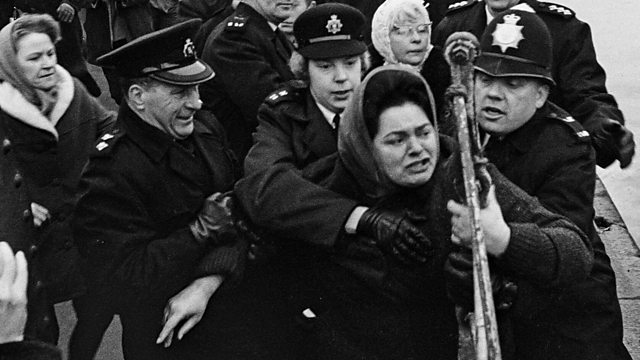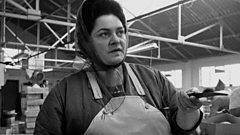
Hull's Headscarf Heroes
The story of Hull's triple trawler tragedy fifty years ago in 1968, in which 58 deep sea fishermen died, and the protest by local women who fought for greater safety at sea.
Documentary which marks the 50th anniversary of the triple trawler tragedy during January and February of 1968, in which 58 men died. It was one of Britain's deadliest maritime disasters, which tore through the heart of Hull's Hessle Road fishing community. The film tells the epic story of the Hull fishermen who did the most dangerous job in Britain and their wives whose protest ensured such a disaster never happened again. The women's campaign was one of the biggest and most successful civil action campaigns of the 20th century. Combining rare archive and emotional testimony - including that of Yvonne Blenkinsop, the last surviving leader of the women - those who lived through the tragedy and fought for change tell their incredible stories for the first time.
By the 1960s Hull was home to the greatest deep sea fishery on earth. 150 deep sea trawlers were based at St Andrews Dock and every year they brought in up to a quarter of a million tons of fish - 25 per cent of Britain's total catch. But to bring in such large quantities Hull's trawlermen had to take enormous risks, because the best hunting grounds were 1,000 miles away in the dangerous Arctic waters around Iceland. There was little regard for the men's health and safety, making this by far the most dangerous job in Britain with 6,000 Hull men lost at sea.
For Hull's women the fact that their men could die at work at any time was a constant worry, made bearable only by the joy of their return. We hear tragic stories of lost loved ones that cast a shadow over family life. This long history of hurt formed the background to the triple trawler disaster of January and early February 1968- an event which rocked even this extraordinarily stoic community.
In January 1968, Hull's trawlers headed into the Arctic in their quest for the biggest catch. By early February it became clear that three of them had sunk, first the St Romanus, then the Kingston Peridot and finally the Ross Cleveland. The last two were fishing in Arctic waters when they were hit by the worst storm in living memory and were obliterated by the hurricane force winds, blizzards and ferocious waves. Altogether 58 men were drowned.
Among those who lost a loved one was 17-year-old mother-of-two Denise Wilson. She tells the story of how she became the youngest widow in Hull. The man whose task was to break the news to the families was young port missionary Donald Woolley. He reveals that despite the grief and devastation at the catastrophic loss of so many fathers, brothers and sons, there was an extraordinary spirit of resilience amongst the young wives and mothers.
Fuelled by years of suffering and loss, the headscarfed women rose up to protest against the dangerous working conditions. They were led by larger-than-life fishwife Lilian Bilocca. Her daughter Virginia remembers how she began a petition that was signed by almost everyone in Hessle Road. This was followed by mass meetings, a march on the trawler bosses' offices and dramatic attempts to stop any unsafe trawlers going to sea. What they all wanted was a safer fishing industry - and they were prepared to do anything to get it.
Unbeknown to 'Big Lil' as she came to be known, while she was protesting, her young son Ernie was also caught up in the storm and fighting for his life. He tells the story of his nightmare ordeal. So too does trawlerman Ken Shakesby, who also nearly died in the storm. His wife Jean was another headscarf protester who almost lost her husband.
Yvonne Blenkinsop is the last survivor amongst the women who led the protest. She tells how she was inspired to fight for change by the death of her own father at sea a few years before. She made passionate speeches to the women of Hessle Road about the need for greater safety at sea. After preventing unsafe ships from leaving St Andrews Dock in Hull, during the first week of February 1968 three of the leaders - including Yvonne - travelled to London for top-level talks with the government. 88 safety measures were enacted immediately. The first to be implemented was a mother ship complete with up to date medical and radio facilities. The new fishermen's charter laid the foundations for safety at sea for generations to come, and was welcomed by all.
But in the 1970s the Hull fishing industry fell into rapid decline with the Cod Wars and sadly the old fishing industry disappeared. As it went the memory of what Yvonne, Lil Bilocca and the other women had achieved also faded. When Lil died in 1988 at the age of 59 there was little fanfare. Nevertheless today, with Hull as City of Culture there is now at last new recognition for the women who led one of the most successful protest movements of the last 50 years: Lil Bilocca and the 'headscarf heroes,' including the last surviving leader, the extraordinary Yvonne Blenkinsop.
Last on
Clip
-
![]()
The protest begins
Duration: 02:11
Credits
| Role | Contributor |
|---|---|
| Director | Steve Humphries |
| Producer | Nick Maddocks |
| Editor | Andy Attenburrow |

